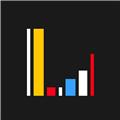Beta
評估一種證券系統性風險的工具,用以量度證券或投資證券組合相對總體市場的波動性。貝塔系數利用回歸的方法計算:貝塔系數爲1,即證券的價格與市場同幅度地變動;貝塔系數高於1,即證券價格的波動性比市場高;貝塔系數低於1,即證券價格的波動性比市場低。
A measure of the volatility, or systematic risk, of a security or a portfolio in comparison to the market as a whole. Beta is used in the capital asset pricing model (CAPM), a model that calculates the expected return of an asset based on its beta and expected market returns..
Also known as "beta coefficient".
Beta is calculated using regression analysis, and you can think of beta as the tendency of a security's returns to respond to swings in the market. A beta of 1 indicates that the security's price will move with the market. A beta of less than 1 means that the security will be less volatile than the market. A beta of greater than 1 indicates that the security's price will be more volatile than the market. For example, if a stock's beta is 1.2, it's theoretically 20% more volatile than the market.
Many utilities stocks have a beta of less than 1. Conversely, most high-tech Nasdaq-based stocks have a beta of greater than 1, offering the possibility of a higher rate of return, but also posing more risk.






